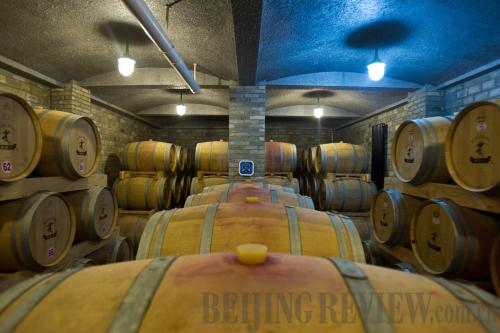|
 |
|
EYE ON THE PRIZE: Oak barrels imported from France have helped Ningxia Xixia King Winery (Group) Co. Ltd. make higher profits (DONG FANG) |
The storage cellar of Ningxia Xixia King Winery (Group) Co. Ltd. is filled with the expected large oak barrels of wine. What's unexpected are the names of international celebrities and politicians, the former German Defense Minister Rudolf Albert Scharping and former Argentina Transportation Minister Jermyn Kamllows for instance, tagged on specific barrels.
"People have come here and decided to buy the whole barrel of wine after tasting a glass or two," said Wang Pinglai, Director of the Department of Production, providing an explanation for the tags.
Founded in 1984, Ningxia Xixia King Winery (Group) Co. Ltd. was the first enterprise to dive into the grape-planting and wine-brewing industry in the autonomous region. Its vineyards are located on the eastern side of the Helan Mountains, found conveniently between the 37th and 38th northern latitude lines recognized as the golden zone for growing grapes. Drawing on its excellent natural conditions, Ningxia aspires to develop its wine industry for the international market.
Ningxia has decided to expand its grape-growing area to 40,000 hectares, with more than 33,300 hectares devoted to wine grapes, and increase its wine-processing capacity to 200,000 tons, in an effort to yield 2 billion yuan ($308 million) in its total output value by the end of 2015.
Blessed conditions
Today, Ningxia Xixia King Winery (Group) Co. Ltd. has expanded its grape-growing area to more than 7,000 hectares with a diverse mix of grape varieties. This area boasts the best natural conditions for grapes with its dry climate, adequate sunshine, large temperature difference between day and night, high gas permeability in the soil and high content of organic materials in soil.
These pristine natural conditions in the eastern part of the Helan Mountains give the grapes a strong aroma, bright color, high sugar content and low incidence of disease.
"All our wines are made of 100 percent grape juicy and are free from any additives," said Wang.
The fertile soil for growing grapes has attracted not only local wine brewers, but also famous brewers from other parts of China and abroad. According to Guo Binchen, Deputy Director of the Development and Reform Commission of Ningxia Hui Autonomous Region, China's three top wine producers—Shandong-based ChangYu Pioneer Wine Co. Ltd., Hebei-based China Great Wall Wine Co. Ltd. and Tianjin-based Dynasty Fine Wines Group Ltd.—have established their own grape-planting bases there. The world's second largest wine brewer, France-based Pernod Ricard Group, also has vineyards in the area.
In recent years, with government support, more than 20 local wine companies have been established on the eastern edge of the Helan Mountains.
In 2008, the State Council, China's cabinet, issued a notice on promoting the development of Ningxia. The notice designated the wine industry as Ningxia's pillar industry. The local government has since allocated a subsidy of 5 million yuan ($770,000) and a soft loan of nearly 100 million yuan ($15.4 million) annually to support the wine industry.
In an effort to increase the grape-growing area, Ningxia began offering a subsidy of 120 yuan per mu (1 mu=0.067 hectare) for wine grape planting in 2009. Some local governments even allowed major wine brewers to grow grapes on barren mountains for free. Major wine brewers are exempt from agricultural taxes and are provided with subsidies for forestation. The city of Qingtongxia offers loans to farmers who plant grapes for ChangYu Pioneer Wine.
In 2000, Xixia King wine won a gold medal at the Paris Wine Expo. The Ningxia vineyard hopes to acquire similar wins in the next few years.
Bigger market goals
Despite the fact that the number of wine companies has been increasing rapidly in Ningxia in recent years, Ningxia aspires to upgrade its business mode and eyes a higher-end market.
"Our wine used to be sold for no more than 100 yuan ($15.4) per bottle. Since we started using oak barrels imported from France to store wine, the price jumped to 600 yuan ($92.3) per bottle," Wang said.
Wine brewing is only part of the grape industry on the eastern side of the Helan Mountains. Ningxia is vying to extend its grape industry chain and reap greater profits. In 2009, Ningxia Agricultural Reclamation Group Co. Ltd., the parent company of Ningxia Xixia King Winery (Group) Co. Ltd., launched the construction of a small town to promote the grape-growing culture. The project, located in Xixia King's vineyard in Yuquanying, includes a wine culture museum, hotels and sightseeing spots. Estimates hold that the wine town will realize a total annual income of 1.6 billion yuan ($246 million) and receive 300,000 visitors every year after it is completed in 2015.
Ningxia Hui Autonomous Region
Location: Upper reaches of the Yellow River in northwest China
Population: 6.3 million
Area: 66,400 square km
Climate: Typical continental; semiarid in the south and central part, arid in the north
(Source: www.nx.gov.cn)
| 